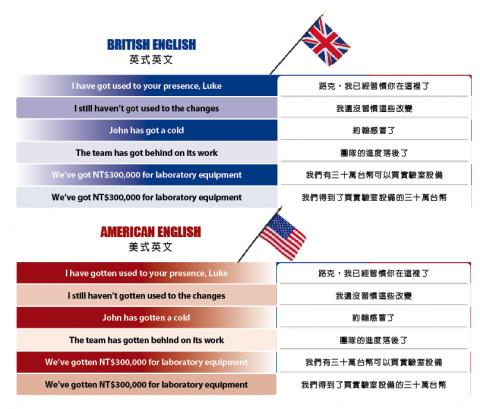Many people confuse the words “got” and “gotten,” and believe the latter to be an American linguistic innovation. Actually, there is a very logical distinction between the two, and it is the British who have dropped the usage of “gotten,” not the Americans who have invented it.
According to the Oxford English Dictionary, the first use of gotten can be traced back to the 4th century, long before American even existed.
Simply stated, “got” is the past tense of “get,” while “gotten” is its past participle, in the same way that English has eat/ate/eaten and forget/forgot/forgotten. In American English, it is possible to say “I got a cold last week” and “I have gotten a cold.” The British, on the other hand, have forgotten how to use gotten (they forgot it, apparently, about 300 years ago) and now use “got” as both past simple and past participle. A Brit would therefore say “I got a cold last week” and “I have got a cold.”

In British English, then, it’s quite simple: just use “got.” The word “gotten” only exists in British English in established phrases such as “ill-gotten gains.”
Another way to think of the distinction between “got” and “gotten” in American English is that “have got” refers to possession (“I have got eight cars”) and “have gotten” (the present perfect of “to get”) describes a dynamic situation (“I have gotten [obtained/acquired] eight cars over the course of the past few years”).
(Paul Cooper, Taipei Times)
許多人把「got」和「gotten」這兩個字搞混,以為「gotten」是美國語言所新創。但這兩個字之間有很合邏輯的區別,其實是英國人捨棄不用「gotten」一字,並非美國人發明了這個字。
根據牛津英語字典,「gotten」的首次使用可追溯到西元第四世紀,年代遠早於美國人。
簡言之,「got」是「get」的過去式,而「gotten」則是其過去分詞,如同英文動詞變化eat∕ate∕eaten,以及forget∕forgot∕forgotten一樣。在美式英文中,可以說「I got a cold last week」(我上週感冒了),以及「I have gotten a cold」(我感冒了)。但英國人卻忘了怎麼用「gotten」(顯然他們是在約三百年前忘記的),如今是把「got」兼用作簡單過去式和過去分詞。因此英國人會這樣說:「I got a cold last week」(我上週感冒了),以及「I have got a cold」(我感冒了)。
這在英式英文就非常簡單:只要用「got」即可。在英式英文中,「gotten」一字只存於既定的片語,例如「ill-gotten gains」(不義之財)。
美式英文中「got」和「gotten」的區別,可用另一種方式思考:「have got」是指「擁有」,例如「I have got eight cars」(我有八輛車);而「have gotten」(「to get」的現在完成式)則是描述一種動態的情況,例如「I have gotten [obtained/acquired] eight cars over the course of the past few years」(在過去幾年中,我﹝取得∕購得﹞了八輛車)。
(台北時報林俐凱譯)

Renhe sat stiffly at the Wei Ya banquet, picking at the symbolic dishes on the table. Fish for abundance, sticky rice cake for progress — it all seemed superstitious to him. The shrine to the Land God near the entrance, adorned with offerings, incense, and fruit, struck him as frivolous. “What does this have to do with running a business?” Renhe scrolled on his phone as his co-workers performed skits and poorly sung songs. He wasn’t even paying attention to the lucky draws when his name was called. The room filled with applause and cheers as he went to the stage

The cocoa industry is currently facing a crisis, with this year’s cocoa trading price soaring to an unprecedented $10,000 per ton—a 400 percent increase from last year—stemming from diminished crop yields. Given cocoa’s indispensable role in chocolate-making, this surge has driven up chocolate prices and triggered concerns about the sustainability of global chocolate production. West Africa, home to over half of the world’s cocoa trees, is at the center of this issue. The Republic of Cote d’Ivoire and the Republic of Ghana, in particular, are facing severe challenges from both natural disasters and human-induced factors, substantially impacting cocoa harvests. Climate change, with

A: What were the highest-grossing films globally last year? B: “Inside Out 2” was the highest, followed by “Deadpool & Wolverine,” “Despicable Me 4,” “Dune: Part 2” and “Moana 2.” A: “Inside Out 2” was also the highest-grossing film in Taiwan. B: It grossed nearly US$1.7 billion worldwide, or NT$55 billion, becoming the best-selling animated film of all time. A: I can’t believe I missed the movie last year. A: 去年全球最賣座的電影有哪些? B: 冠軍是《腦筋急轉彎2》,其後是《死侍與金鋼狼》、《神偷奶爸4》、《沙丘:第2部》、《海洋奇緣2》。 A: 《腦2》也是去年台灣票房冠軍耶。 B: 這部鉅片狂賣近17億美元,約550億台幣,成為全球影史最賣座動畫電影! A: 真不敢相信我錯過了這部強片。 (By Eddy Chang, Taipei Times/台北時報張聖恩)

A: In addition to “Inside Out 2” at the top, what were the other highest-grossing films domestically last year? B: “Gatao: Like Father, Like Son” was the only Taiwanese movie among the top 10 blockbusters, which included five animated films. A: I’m surprised that the Taiwanese hit “The Pig, the Snake and the Pigeon” wasn’t on the chart. B: But it grossed over 500 million Chinese yuan in China, which is nearly NT$2.5 billion. The figure was five times higher than that of the best-selling film in Taiwan. A: Its success shows that Taiwanese movies should go international. A: